Johanna Moore, Ashka Jhaveri, Annika Ganzeveld, Kathryn Tyson, Amin Soltani and Brian Carter
The Iran Update provides insights into Iranian and Iranian-sponsored activities abroad that undermine regional stability and threaten US forces and interests. It also covers events and trends that affect the stability and decision-making of the Iranian regime. The Critical Threats Project (CTP) at the American Enterprise Institute and the Institute for the Study of War (ISW) provides these updates regularly based on regional events. For more on developments and in Iran and the region, see our interactive map of Iran and the Middle East.
Key Takeaways:
- Palestinian militias continued indirect fire from the Gaza Strip into Israel on October 20. Hamas also released two American hostages held in Gaza, marking the first time Hamas has released any hostages since its October 7 attack into Israel.
- Clashes between Palestinian militants and Israeli security forces in the West Bank increased following Hamas calls for protests on October 18. The Israel-Hamas War may be driving Palestinian militia coordination in the West Bank.
- Iranian-backed militants targeted US forces stationed at Baghdad International Airport (BIAP) and al Harir Air Base on October 20, marking the third consecutive day of attacks against US forces in the Middle East. Iranian-backed Iraqi militias have threatened to continue attacks on US forces in the Middle East.
Gaza Strip
Palestinian militias continued indirect fire from the Gaza Strip into Israel on October 20. The al Qassem Brigades—Hamas' militant wing—claimed ten rocket, mortar, and drone attacks. Saraya al Quds—the militant wing of Palestinian Islamic Jihad—claimed responsibility for another seven rocket attacks. This rate of attacks is consistent with the rates that CTP-ISW has observed in recent days. Both groups continue to frame these attacks as being in response to Israeli “massacres” against civilians.
The al Qassem Brigades claimed responsibility for the first armed drone attack since October 15, which destroyed an Israeli Defense Forces (IDF) tank.[1] The al Qassem Brigades released a propaganda video and two photographs on October 20 of its drones and drone attacks and threatened further attacks.[2] The al Qassem Brigades has used these drones to strike IDF soldiers and infrastructure in attacks since October 7.[3]
Hamas released two American hostages held in Gaza, marking the first time Hamas has released any hostages since its October 7 attack into Israel. Hamas military spokesperson Abu Ubaida released a statement on October 20 claiming that it had released the hostages after Qatari mediation efforts.[4] Ubaida also said that the hostage release was in response to US President Joe Biden‘s “false allegations” about the group during Biden’s address on October 19.[5] Hamas continues to hold over 200 other hostages.
IDF airstrikes continue to kill Hamas leadership and operatives in Gaza. The IDF killed senior Hamas engineer Mahmoud Zavih on October 20.[6] The IDF reported that Zavih was responsible for weapons production for Hamas' military wing, the al Qassem Brigades.[7] The IDF said the leader “exchanged knowledge with other terrorists in the Middle East,” suggesting the leader supported the weapons production effort of other Axis of Resistance groups in the region.
The IDF is degrading Hamas’ naval capabilities which Hamas could use to target Israeli gas rigs and other infrastructure, according to an Israeli journalist.[8] An IDF airstrike on October 19 killed a member of Hamas’ naval branch in Gaza who the IDF claimed was plotting maritime attacks.[9] The IDF also killed another member of Hamas’ naval branch in Gaza who participated in Hamas’ attack into Israel on October 7.[10] Hamas has worked to develop its naval capabilities in recent years. The IDF reported in 2021 that Hamas for the first time developed unmanned sea vessels to launch attacks in Israel.[11]
Recorded reports of rocket attacks; CTP-ISW cannot independently verify impact.
Recorded reports of rocket attacks; CTP-ISW cannot independently verify impact.
West Bank
This map is not an exhaustive depiction of clashes and marches in the West Bank.
Clashes between Palestinian militants and Israeli security forces in the West Bank increased following Hamas calls for protests the day before. CTP-ISW recorded 17 distinct clashes and 12 demonstrations in the West Bank on October 20. Many demonstrators condemned the Israeli raid on the Nour Shams refugee camp on October 19 where six Palestinians and one Israeli officer died.[12] Unspecified militants detonated an IED targeting an IDF convoy at the camp overnight.[13] Hamas called for protests in support of the Gaza Strip across all cities and towns in the West Bank on October 20, as part of Hamas’ effort to expand fighting against Israel to the West Bank.
The Israel-Hamas War may be driving Palestinian militia coordination in the West Bank. The IDF said on October 17 that it arrested 440 wanted for arrest Palestinians in the West Bank—including 220 Hamas-affiliated Palestinians individuals—since the war began on October 7.[14] The Palestinian Authority Health Ministry noted that Israeli security forces killed 41 West Bank Palestinians between October 7 and October 17.[15] The UN added on October 14 that the week following October 7 was the deadliest week for Palestinians in the territory since at least 2005.[16] CTP-ISW is closely monitoring the risk of conflict expanding in the West Bank.
- Palestinians held Hamas and Fatah flags at a demonstration in Hebron and Yatta condemning Israeli attacks and in support of Gaza. The IDF dropped leaflets in Hebron warning it will find and catch anyone who identifies themselves as a member of Hamas.[17] Hamas chairman Khaled Mashaal called on Fatah to defeat Israel together.[18] The Hamas and Fatah signed a reconciliation deal on October 13 after having been at odds for more than a decade.[19]
- Hamas claimed that al Qassem Brigades fought in the Nour Shams camp on October 19.[20] The PIJ-affiliated Tulkarm Brigade said that several Palestinian groups supported them during the fighting.[21] This is the first coordinated small arms clash that a Palestinian militia has claimed in the West Bank since October 7.
- Hamas continued to message that the resistance in the West Bank and Gaza must work together. Hamas’ Political Bureau leader Ismail Haniyeh delivered a speech on October 9 praising the mass popular movement in support of Gaza over the past few days, noting that Israeli aggression extends to the West Bank.[22] Coordinated Palestinian resistance in the West Bank supports Hamas’ stated objectives to expand the war to the West Bank.
Southern Lebanon and Golan Heights
Recorded reports of rocket attacks; CTP-ISW cannot independently verify impact.
Attacks from Lebanon into northern Israel risk further escalation between Israel and Lebanese Hezbollah (LH). Two attacks in northern Israel killed at least one IDF soldier and wounded three more.[23] The IDF soldier killed in action on October 20 marks the sixth IDF soldier killed in action on the Israel-Lebanon border since October 7.[24] LH released a statement on October 19 that warned that violation of “Lebanon’s security” will not go unanswered, which suggests that LH will continue to respond to Israeli airstrikes that the IDF conducts in response to LH attacks.[25] LH targeted IDF positions with two Kornet anti-tank guided missiles near Natua and Barnit in retaliation for IDF shelling of southern Lebanon.[26] The attack killed one IDF soldier and wounded another, according to LH.[27] The IDF responded with airstrikes against LH positions.[28] At least one unspecified militant infiltrated Israel on October 20 for the first time since October 13 near Margoliot, seriously injuring one IDF soldier.[29]
LH conducted 18 attacks targeting civilian and military infrastructure in northern Israel on October 20, which is consistent with its rate of attacks since October 15.[30] CTP-ISW recorded between three and five attacks daily between October 12 and October 14.[31] CTP-ISW has recorded between nine and 20 attacks targeting northern Israel daily since October 15.[32]
The IDF intercepted an unspecified drone crossing the Israel-Lebanon border near the Upper Galilee region on October 20.[33]
Iran and Axis of Resistance
Iranian-backed militants targeted US forces stationed at Baghdad International Airport (BIAP) and al Harir Air Base on October 20, marking the third consecutive day of attacks against US forces in the Middle East.[34] The Islamic Resistance in Iraq - an umbrella group of Iranian-backed Iraqi militias - targeted US forces stationed at Al Harir Air Base in Iraqi Kurdistan on October 20 in a drone attack.[35] It claimed to have launched two drones targeting the air base and reported that both drones “hit their target.”[36] This is the fourth attack claimed by the Islamic Resistance of Iraq during the last three days.[37] Militants from the Islamic Resistance in Iraq targeted Al Harir Air Base and Ain al Asad in Iraq and the al Tanf Garrison and Conoco Mission Support Site in Syria on October 18 and 19.[38]
Unidentified militants targeted US forces stationed at BIAP in a rocket attack on October 20.[39] Iraqi Security forces found the rocket launch site in Jihad neighborhood, which is adjacent to the airport.[40] The counter-rocket artillery mortar (C-RAM) system at BIAP engaged two rockets, destroying one.[41] This is the first attack on BIAP since October 7. No group has claimed the attack on BIAP at the time of publication.
Iranian-backed militias have conducted eight attacks over the past three days across the Middle East in a multi-theater escalation against the United States and Israel. Iranian-backed Iraqi militias threatened to conduct attacks on US forces in the region if the United States intervened in the Israel-Hamas war, as CTP-ISW previously reported.[42] Iranian-backed Iraqi groups are currently behaving as though the United States has crossed this red line. Armed Forces General Staff Chief Major General Mohammad Bagheri warned on October 19 that continued Israeli actions in the Gaza Strip could force “other actors,” including “resistance groups,” to engage in the conflict, echoing previous regime rhetoric about the possibility of a conflict expanding.[43]
Iranian-backed Iraqi militias have threatened to continue attacks on US forces in the Middle East. Tura News, affiliated with Iranian-backed Kataib Hezbollah, circulated a warning of additional attacks on US forces in Iraq “in the next few days.”[44] Iranian-backed Badr Organization released a promotional video repeating the group’s threat to attack the United States if it intervenes in the Israel-Hamas war.[45]
Ashab al Kahf released a statement on October 20 threatening to conduct improvised explosive device (IED) attacks on US forces.[46] Ashab al Kahf is a member of the Islamic Resistance of Iraq which claimed the one-way drone attack on US forces stationed at Ain al Asad Air Base on October 18.[47] Ashab al Kahf claimed 3 IED attacks targeting US logistics convoys in Iraq between July and August 2023.[48]
IRGC-QF Commander Brigadier General Esmail Ghaani warned Syrian President Bashar al Assad during his visit to Syria on 15 October that Iran intends to use Syria as a second front if the Israel-Hamas war expands geographically.[49] The Islamic Revolutionary Guard Corps (IRGC) began directing militias to the southwestern Syrian border immediately after the Hamas-led attack into Israel on October 7. Iranian officials have since messaged that a multi-front war against Israel is becoming more likely.
- Najafi reported that Ghaani established a joint operations room in Syria during his visit on October 15.[50] The IRGC will oversee this operations room, according to Iranian state-news journalist Mostafa Najafi.[51] An unspecified Iranian intelligence official said that Iran will start a “limited” ground operation from the Golan Heights and notably not from Lebanon if the situation escalates to protect LH.[52]
- Syrian opposition media reported on October 19 that the Axis of Resistance, in coordination with the Syrian regime, plan to surprise Israel and create a narrative in which the Axis represents the main resistance to Israel.[53] Iranian-backed militias are deployed along the southwestern Syrian border in Rif Dimashq and Daraa province.[54] CTP and ISW have tracked the IRGC and LH from Syria and Iraq deploying to the border of Syrian and the Israeli-occupied Golan Heights since October 9.
Iranian-backed militias have relocated ammunition and equipment to residential areas in Deir ez Zor City and Hatla, Deir ez Zor Province on October 19 according to a report from anti-regime news outlet Syrian Observatory for Human Rights (SOHR).[55] According to local sources cited by SOHR, Iranian-backed militias began transferring weapons to residential areas in fear of a possible retaliation from US forces. The Islamic Resistance of Iraq targeted US forces stationed at al Tanf Garrison and Conoco Mission support site in eastern Syria on October 19, as CTP-ISW previously reported.[56] US forces have targeted Iranian-backed militia weapons storage facilities in Syria in retaliation for strikes on US positions in Syria previously, most notably during the last escalation cycle between the United States and militias in March 2023.[57]
LH and Iraqi Popular Mobilization Forces (PMF) arrived in al Mayadin, Deir ez Zor Province, Syria on October 19. LH militants were transferred from Idlib Province, Rif Dimashq Province, and Hatla, Deir ez Zor Province.[58] Popular Mobilization Forces arrived in al Mayadin from Iraq the same day.[59]
PMF supporters traveled to the Iraq-Jordan border near Trebil, Iraq to stage a sit-in in support of the Palestinian people.[60] Sadrist Movement leader Moqtada al Sadr called for Iraqis to hold a sit in on the border with Palestine and remain “until the siege is lifted.”[61] Jordanian authorities did not comment on any convoys traveling to the border; however, Jordanian security forces closed the al Karameh Border Crossing with the West Bank according to Iraqi Kurdistan-based Shafaq news.[62]
Palestinian Islamic Jihad (PIJ) spokesperson Nasser Abu Sharif stated that the potential for normalization of relations between Israel and Saudi Arabia motivated Hamas’ October 7 attack during an Iranian conference on the Israel-Hamas war in Qom on October 20.[63] Sharif argued that the normalization of relations between Israel and Saudi Arabia would have dealt a devastating blow to the Palestinian cause. He also mentioned that many unspecified intra-Palestinian issues also “justified” the Al Aqsa Flood operation. Sharif further claimed that LH Secretary General Hassan Nasrallah is awaiting a simple “phone call” from resistance leaders before attacking Israel, consistent with Iranian and Axis of Resistance rhetoric about the potential expansion of the conflict since October 13.[64] Sharif finally claimed that Supreme Leader Ali Khamenei has forbidden Palestinian groups from granting any concessions or retreating, consistent with CTP-ISW's previous assessment that the Palestinian resistance is preparing for a prolonged conflict with Israel.[65]
Iranian Friday prayer leaders echoed Supreme Leader Ali Khamenei’s recent claim that the United States is responsible for Israeli actions against the Gaza Strip during their sermons on October 20. Khamenei accused the United States of determining Israel’s “current policy” vis-à-vis the Gaza Strip during a speech on October 17, as CTP-ISW previously reported.[66] Mashhad Friday Prayer Leader Ahmad Alam ol Hoda emphasized that the United States, not Israel, is the “main perpetrator” of killings and bombings in the Gaza Strip.[67] Varamin Friday Prayer Leader Mohsen Mahmoudi similarly claimed that the United States is “the root of all Israeli crimes."[68] Pardis Friday Prayer Leader Hossein Hosseini asserted that Israel is carrying out attacks against women, children, and hospitals in the Gaza Strip “under the heads of American statesmen.”[69] This coordinated rhetoric from Friday prayer leaders suggests that Khamenei and his inner circle are directing this messaging campaign. Friday prayer leaders receive guidance for the content of their sermons from the Office of the Supreme Leader.
Iranian officials and media are criticizing US President Joe Biden’s October 18 visit to Israel and framing it as part of US-Israeli preparation for an Israeli ground invasion into the Gaza Strip. Foreign Affairs Minister Hossein Amir Abdollahian described Biden’s visit as “provocative” during a meeting with his Lebanese counterpart Abdallah Bou Habib on the sidelines of the emergency Organization of Islamic Cooperation meeting in Jeddah on October 18.[70] Defense Minister Brigadier General Mohammad Reza Ashtiani similarly stated that Biden’s visit highlighted US plans to “complicate” the situation in the Middle East during a phone call with his Iraqi counterpart Thabet al Abbasi on October 20.[71]State-run outlet IRNA claimed on October 20 that the purpose of Biden’s visit to Israel was to “strengthen” Israeli attacks against Hamas.[72] Qods Friday Prayer Leader Hamza Mohammadi claimed on October 20 that Biden gave the Israeli government “the green light” for a ground invasion into the Gaza Strip.[73] Regime outlets recirculated Western reporting on October 19 that Biden told Israeli Prime Minister Benjamin Netanyahu that Washington is “fully in support” of a ground invasion.[74]
Iranian officials have begun comparing Israel to ISIS and Hitler after Israeli Prime Minister Benjamin Netanyahu labeled Hamas as “ISIS” and “the new Nazis” on October 17.[75] Foreign Affairs Minister Hossein Amir Abdollahian compared Israel to ISIS while claiming that Israel attacked a Greek Orthodox church in the Gaza Strip on October 20.[76] Iranian Chief Rabbi Younes Hamami Lalehzar separately stated that Israel cannot represent Judaism “just as ISIS cannot represent Islam” during an interview with English-language Press TV on October 20.[77] Passive Defense Organization Head Brigadier General Gholam Reza Jalali described Israel as “a new Hitler in the region” in a speech on October 20.[78] The above rhetoric is consistent with Iranian accusations since October 11 that Israel is committing war crimes and genocide against Palestinians in the Gaza Strip.
Iranian media recirculated Western and Syrian reporting on the October 19 Iranian-backed militant attacks on US military assets. State-controlled Islamic Republic News Agency recirculated the sUS Defense Department’s announcement that it had intercepted several Houthi missiles and drones on October 19.[79] The Iran-backed Houthis launched at least three land-attack cruise missiles and eight drones “potentially” targeting Israel.[80] IRGC-affiliated Tasnim News Agency recirculated Western and Syrian media reporting on Iranian-backed Iraqi militias targeting US forces at Ain al Asad Airbase, Anbar province, Iraq as well as the Conoco Mission Support Site in Syria.[81] The Islamic Resistance of Iraq fired three drones targeting the al Tanf Garrison, Syria and three one-way drones targeting Conoco Mission Support Site on October 19.[82] Iranian-backed Iraqi militias also launched an unspecified number of rockets targeting US forces at the Ain al Asad Airbase.[83]
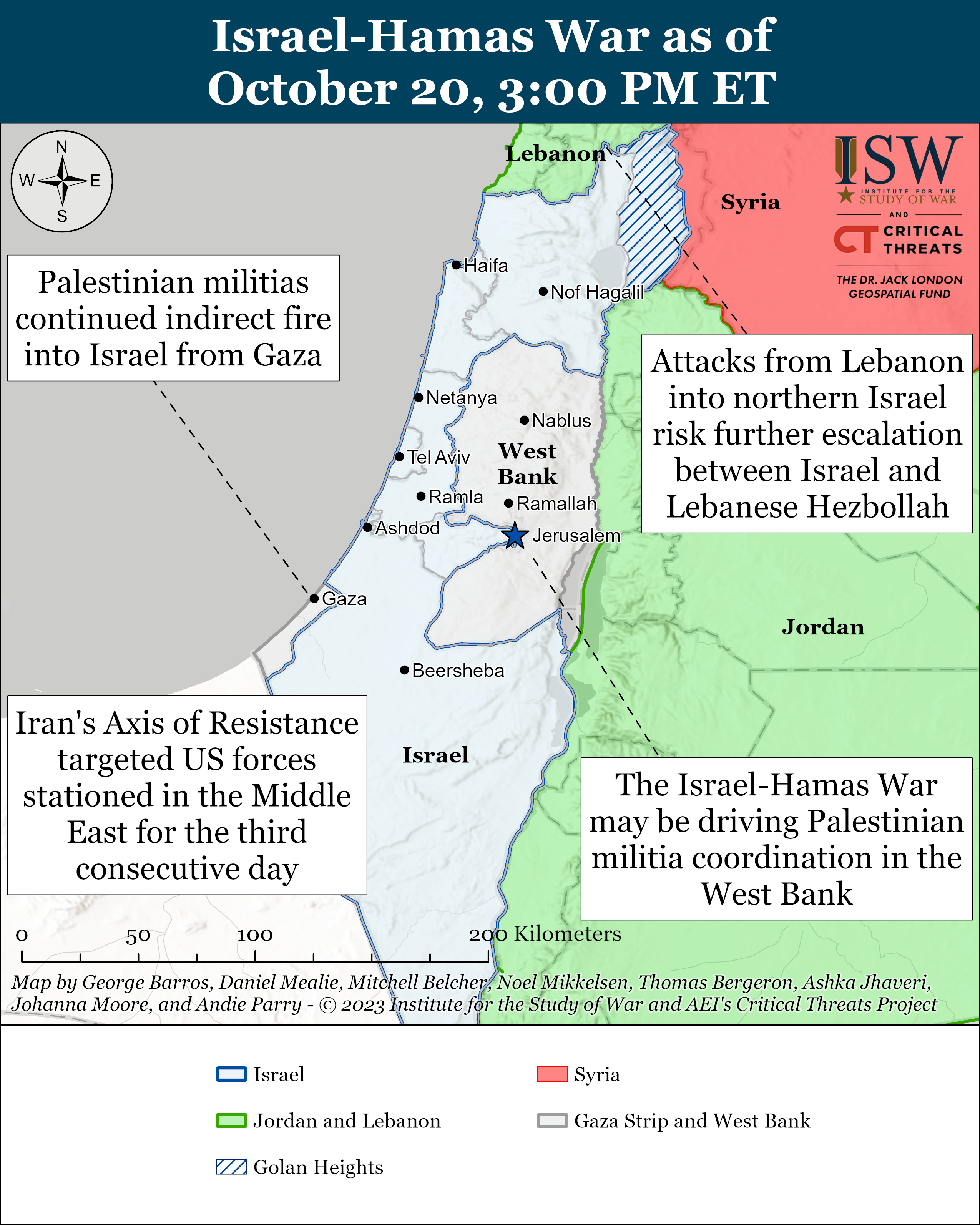
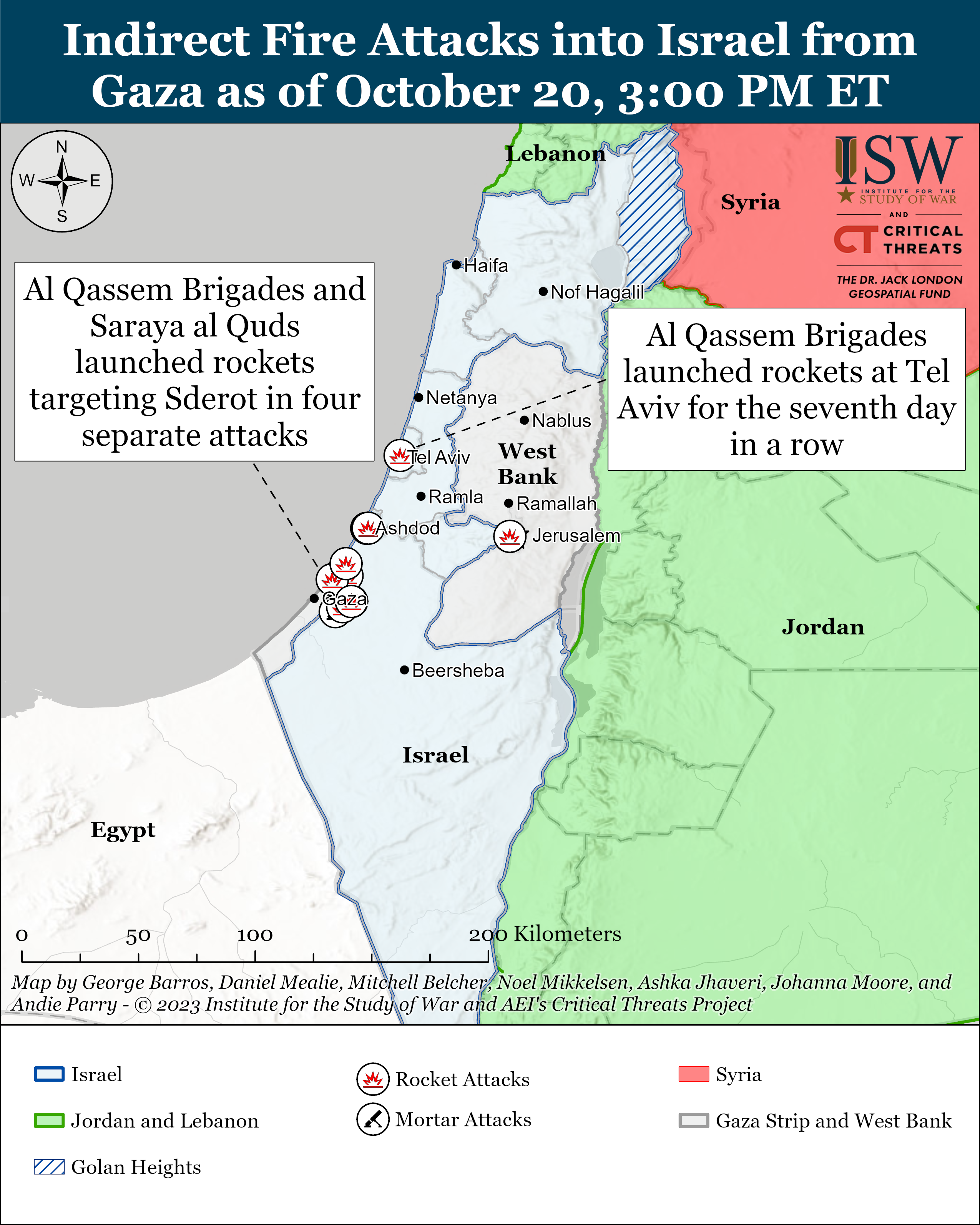
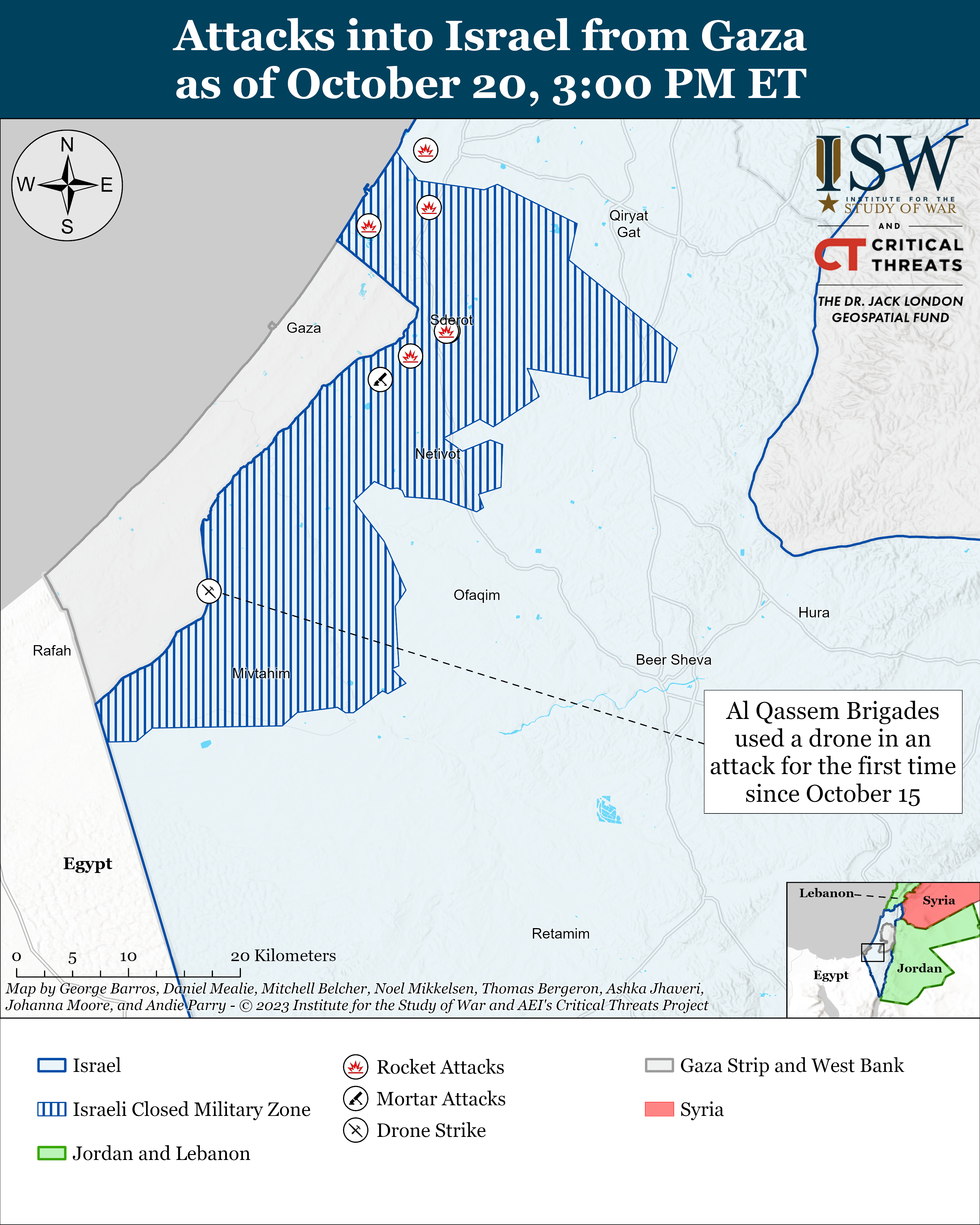
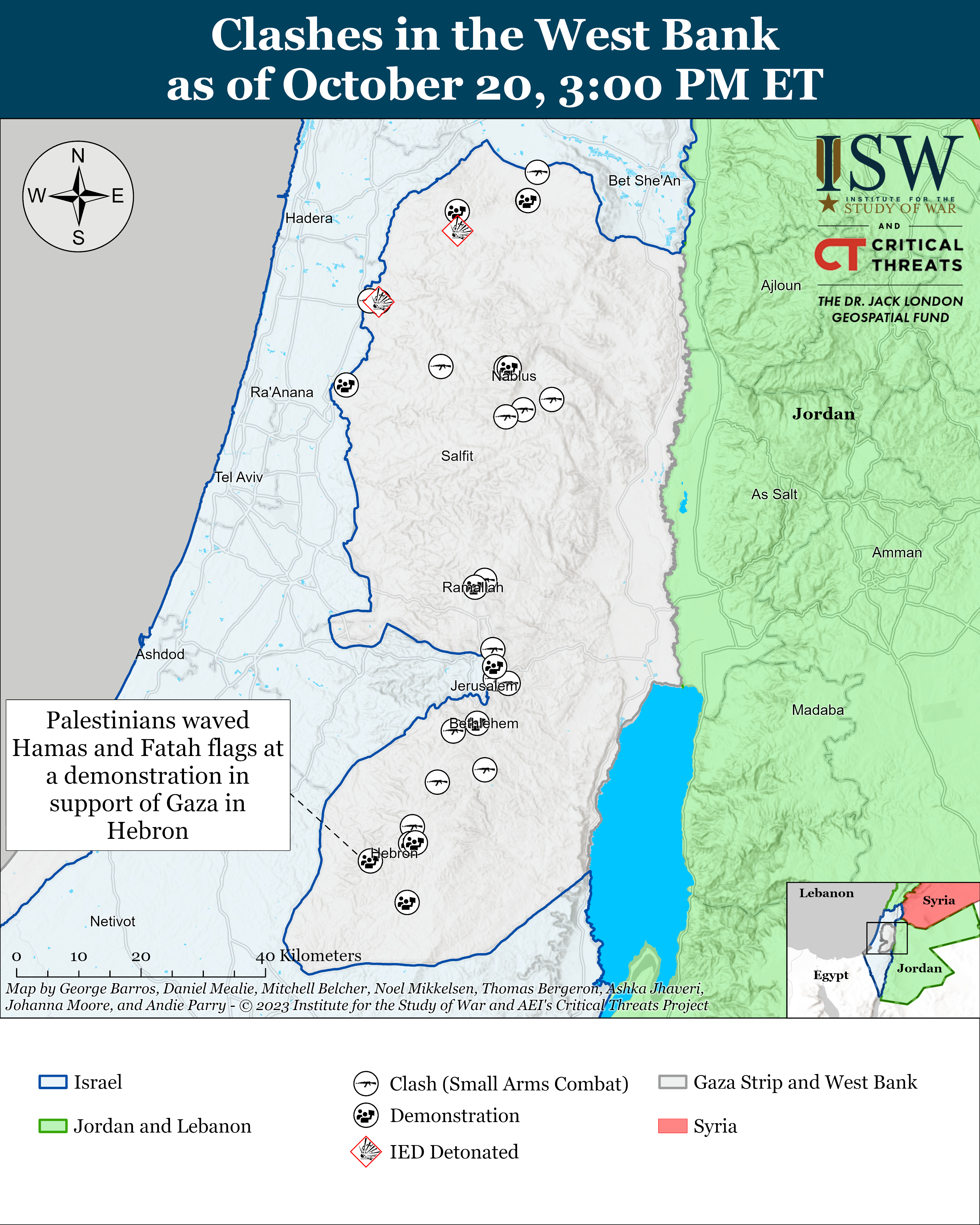
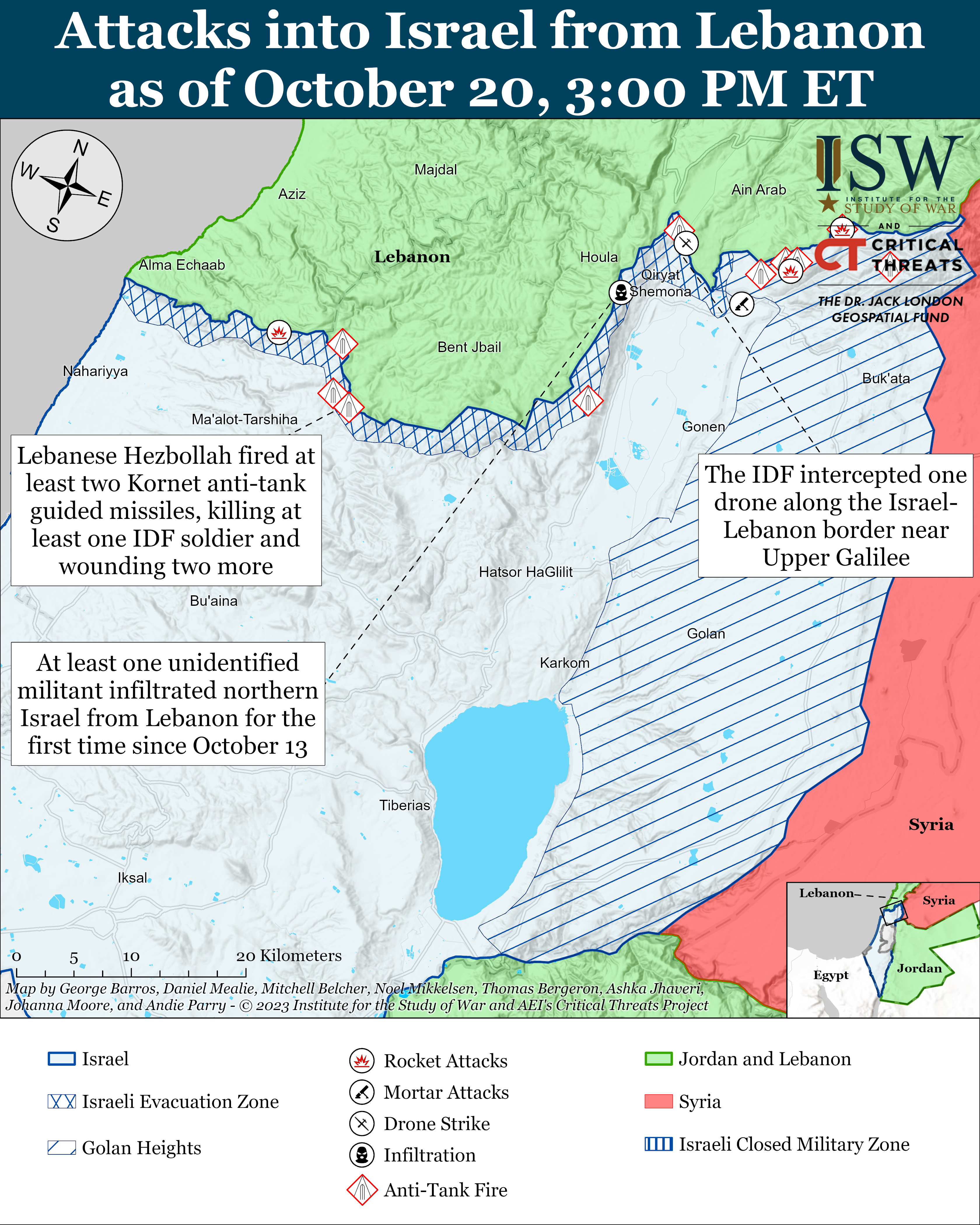
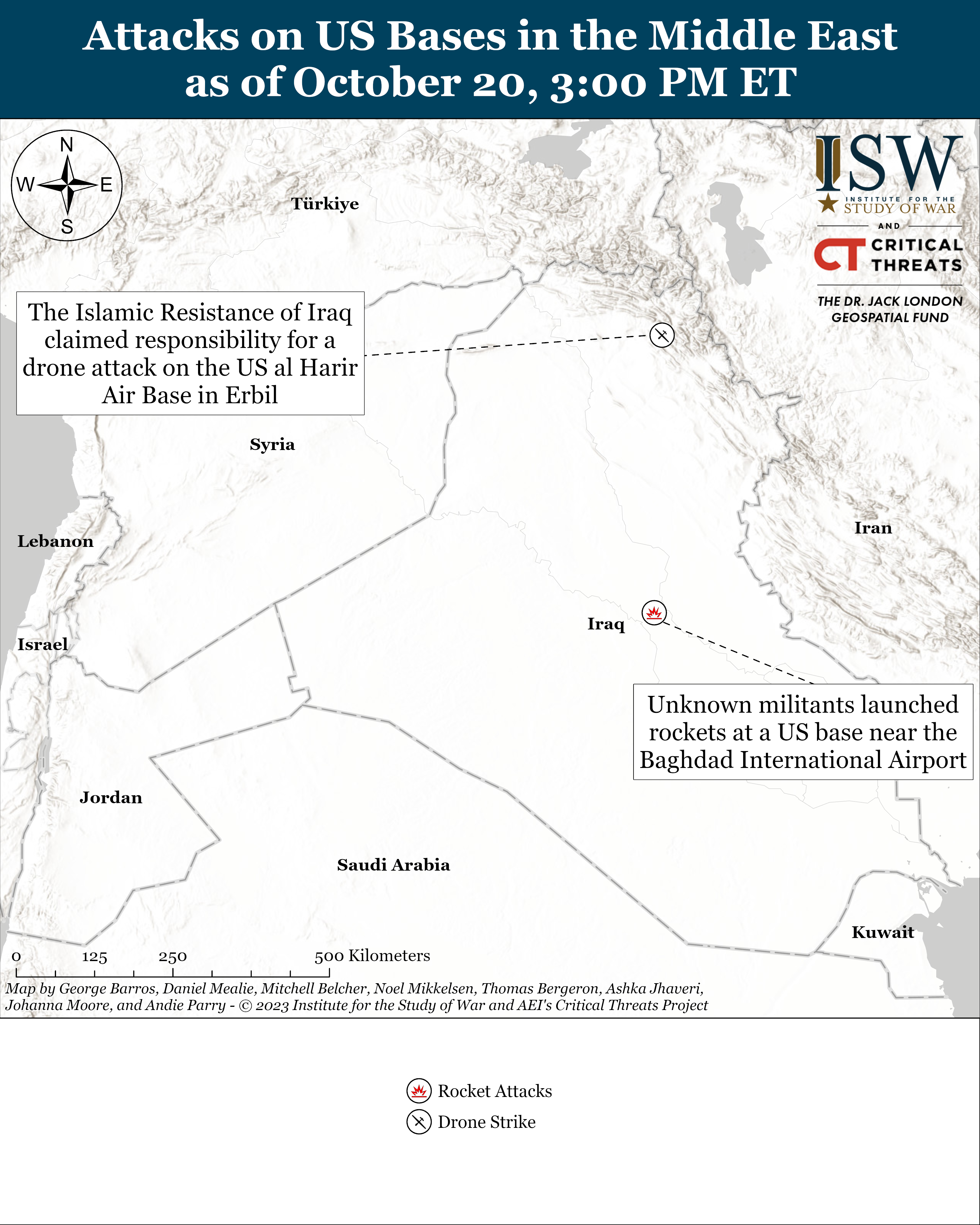
No comments:
Post a Comment